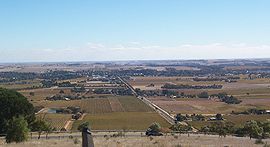Barossa Valley
|
Barossa Valley South Australia |
|
|---|---|

Tanunda is surrounded by vineyards showing Autumn colour.
|
|
| Coordinates | 34°32′S 138°57′E / 34.533°S 138.950°ECoordinates: 34°32′S 138°57′E / 34.533°S 138.950°E |
| Population | 20,000 (2006; approx.) |
| • Density | 20/km2 (52/sq mi) (approx.) |
| Area | 912 km2 (352.1 sq mi) |
| Time zone | ACST (UTC+9.5) |
| • Summer (DST) | ACDT (UTC+10.5) |
| Location | 60 km (37 mi) NE of Adelaide city centre |
| LGA(s) | Barossa Council, Light Regional Council |
The Barossa Valley is a valley in South Australia located 60 kilometres (37 mi) northeast of Adelaide city centre and which is notable as a major wine-producing region and tourist destination. It is the valley formed by the North Para River, and the Barossa Valley Way is the main road through the valley, connecting the main towns on the valley floor of Nuriootpa, Tanunda, Rowland Flat and Lyndoch.
The Barossa Valley derives its name from the Barossa Ranges, which were named by Colonel William Light in 1837. Light chose the name in memory of the British victory over the French in the Battle of Barrosa, in which he fought in 1811. The name "Barossa" was registered in error, due to a clerical error in transcribing the name "Barrosa". The area is approximately 13 by 14 kilometres (8.1 by 8.7 mi).
The three major towns of the Barossa all have distinctive personalities. Tanunda is generally recognised as the most German of the three with long-standing traditions dating back to the 1840s when the first German settlers arrived in the area. Because many of them came from Prussian Silesia, they called the Barossa Neu-Schlesien, or "New Silesia". The German influence survives to this day (see Barossa German). Angaston, in contrast, is considered the English town as it was settled predominantly by Cornish miners and others from Britain. The third (and largest) town, Nuriootpa, was influenced by both the German and British settlers, and today is the commercial hub of the Barossa where most of the larger stores are located. Tanunda and Angaston are considered 'tourist towns' in comparison to Nuriootpa because they have many more facilities to cater for tourists.
...
Wikipedia

